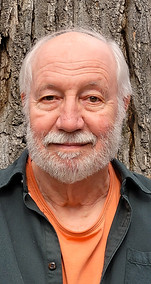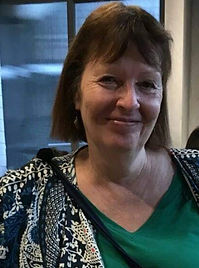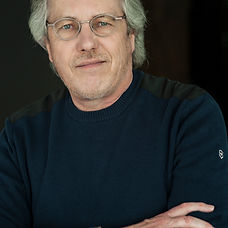Buttonholed
So Uncle Dog Breath was giving me advice about women. He was saying something about mixed signals, and red flags, and thin ice. I wasn’t really listening, all I wanted was for my bus to come.
Suddenly he said “Well shit, here’s my ride” as an old armored car shimmered into existence at the curb. Two ladies with ray-guns drawn, wearing Las Vegas style ostrich plume headdresses got out of the back and motioned my uncle in. All three of them waved and smiled, then the armored car rose up into the clouds and was gone. I like my uncle, but sometimes small doses are best. Well, then my bus started to bubble up out of the sidewalk, so I had to get going.

Doug Mathewson is pleased to return to the pages of “The Odd Magazine, and wishes to thank Editor Sreemanti Sengupta for her kindness. He also would like to thank the various people that have published his work here and there, now and then, off and on, for a dogs age. He restricts himself to short fiction as anything over 300 words in length makes him dizzy. He is also the founding Editor
of Blink-Ink www.blink-ink.org
Mystery
But they never found his head.

Grove Koger is the author of a readers’ guide to travel narratives, When the Going Was Good; a chapbook of poetry, Not; two chapbooks of supernatural stories, Something Strange and Treacherous Waters; and a hybrid collection of poetry, fiction, and nonfiction, Out of Idaho (forthcoming).
When the Dust Settles
“Get that dirty ol' thing outa here!” Max was hollering and Boone was no way gonna argue with him while he was worked up. Max lived in a trailer alongside years of dust that had dug in determined to stay. Just needs a little TLC Boone thought to himself. He was only trying to be a good buddy. After all, Max had shared that moonshine with him last week, when they had roared and laughed, telling tall stories about their female conquests, beneath the light of the silvery moon.
Boone left the trailer hugging his old vacuum cleaner close to his sweaty body that reeked of unwashed denim and apple cider. The dust bag wheezed beneath his firm grip.
“Take no notice of him Darlene, don't go gettin' angry now!” Boone whispered, hearing the hoover a-sighin' and a-wheezin'. He gave her another big squeezy hug, before throwing open the door to his trailer and laying Darlene on the small bunk, climbing next to her, cuddling up close cause there wasn't much room on the narrow bed. The thin mattress groaned and creaked beneath them, as if in harmony with Darlene's sighin' and wheezin'.
Boone heard Max hollering in the night and someone yelling from the open window of a distant trailer. “Will ya shut up Max! Lay off of that dang moonshine! It's driven' yer batshit crazy!”
“Crazy am I? Least I ain't like Boone, kissin' an' canoodlin' with an old carpet sweeper! Now that's what I call crazy!”
Max pulled the dusty threadbare blanket over Darlene, he could sense she was beginning to fret. He lit a cigarette, blowing smoke rings, waiting til that ol' moonshine had worn off or just plain knocked Max out. Finally it was quiet, apart from Max's loud snoring.
Boone awoke with the pale morning sun glaring through the thin floral curtains, sitting up straight. Where was Darlene? Boone saw the door to his trailer swinging open, squeaking back and forth on those darn hinges that he'd never gotten around to oiling.
“No, Darlene!” Boone screamed. He knew Darlene had a real mean streak when she reckoned she'd been scorned.
He raced to Max's trailor, flinging open the unlocked door, falling to his knees when he saw Max all twisted up on his bed, Darlene laying there next to him, looking all innocent, like butter wouldn't melt, thought Boone, the hoover cord wrapped tightly around Max's neck. Boone saw the purple color of Max's face, as if he'd been hollering at Darlene as she pulled the cord tighter.
The people in the trailer park didn't want no sheriff interfering, sniffing around, flashing those dang badges - so they said nothing, just dug a deep hole, rolled Max in and sang a few songs accompanied by Yorick on his banjo. Truth be told they was all a little afraid of Darlene and her bad temper. Anyways, they sure slept well that night, with no hollering and snoring and at least they could thank Darlene for that.

Julie Dron currently lives in Taiwan and has been published in a wide variety of on line magazines and anthologies, most recent being Jerry Jazz Musician, Inkd Publishing, Jayhenge Publishers and Graveside Press
The Cookie Attack
In the dim aisle of Dollar General, fluorescent lights hummed overhead, casting a tired glow on rows of neatly stacked snacks. She stood there — a woman in her late sixties, clutching her purse like it might float her through the storm. Her eyes scanned the cookie shelf, but it wasn’t really the cookies she was searching for.
A craving had taken hold, sure — but beneath it, something deeper pulsed. Loneliness maybe. Guilt, likely. Or the silent scream of someone who needed permission to be okay.
Down the aisle came another shopper, a woman just looking for toothpaste and dish soap. She was about to pass when a voice, low and pleading, stopped her.
“Ma’am?”
The woman turned. The cookie-seeker’s eyes were wide, almost desperate.
“I—do you think it’s okay if I get these?” she asked, holding up a package of Oreos like a confession. “I just... I really want them.”
The shopper blinked. “Uh... yeah. If you want them, get them.”
That seemed like enough. The shopper gave a small nod, turned to go.
But then—again—
“Ma’am?”
She turned back. This time, the woman wasn’t just seeking permission. She looked afraid, her voice barely a whisper.
“Are you sure I can have a cookie? I won’t get in trouble?”
There it was — not hunger, but a cry from somewhere much further down.
The aisle held still. Even the hum of the lights seemed to pause.
“No,” the shopper said softly, stepping closer. “You won’t get in trouble. You can have a cookie. You’re allowed to want something.”
For a second, neither of them moved. Then the woman nodded slowly, clutching the package like it was something sacred.

Lindsay Reddick is a massage therapist who is working on a Business degree. She works as an administrative professional and is interested in becoming a business analyst. She enjoys the great outdoors and experiencing the joys of life.
In the Gym
Dancing-as-though-through-liquid-honey girls pretend not to care about the watch-but-don’t-join-in boys rag-doll-slouching on benches along the far wall. Hand-flapping Kath whispers to sneak-peeking Lilly who now spots slow-shuffle Rich crossing the floor, as hasn’t-spoken-to-Lilly-since-that-one-kiss Jared guitar-strums up on the stage.
Barely-able-to-speak Rich whisper-touches her arm and asks unsure-how-she-feels-about-it Lilly for the next slow dance. Well-deodorized-arm-pits Lilly takes a just-in-case sniff before casual-draping her arms around his hot-under-the-collar neck and he slow-slides his chapped hands to her best-he’s-ever-seen hips.
The feet-barely-off-the-ground couple goes round and round and round, while still-unsure Lilly rests her head on his feels-just-the-right-height chest, knowing those have-to-hunch-their-backs-to-do-the-same-with-their-partner girls are well aware.
As the song ends ate-something-with-onion-for-supper Rich moves in closer to holding-her-breath Lilly with wet-open-mouth lips that land on her quickly-turned cheek, just as red-faced supervising teacher arrives to pull them apart. Up on the stage must-have-seen-it-all Jared’s shoulders jiggle as sure-he-is-laughing-at-her Lilly wipes her cheek with her sleeve and flees.
.jpeg)
Louella Lester is a writer/photographer in Winnipeg, Canada, author of the CNF book Glass Bricks (At Bay Press 2021), contributing editor at New Flash Fiction Review, and is included in Best Microfiction 2024. Her writing/photos appear in variety of journals and anthologies.
Hat Cake
My best friend at 15 was a scorpion tattooed convict and sous chef named Omar. We met working the dinner shift at Shirley’s, an upscale mid-80s-yuppie steakhouse more famous for who ate there than what they served. For me, it was a summer job I could get to using my learner’s permit. Omar had invested years there, starting out as a dishwasher. I first knew the place as a standby for sundry milestones: junior proms, birthdays, and wedding anniversaries. The guys I ran with thought all their waitresses were Bryn Mawr sophisticates, who could buy beer, and quote from Metamorphosis. Their house uniforms were starched white blouses and velvet black pencil skirts that coaxed from their wearers a discomforting metronome-wobble which ignorance mistook for deliberate allure and sultriness. Job applications were done on paper and left in a wooden box near the maître d station. My only prior work experience was tutoring geometry and hauling green clay to surface tennis courts, so it was surprising to get a call for an interview. “Michael, this is Suzy from Shirley’s, would you like to come in and talk about your career opportunities here?”
Suzy was a southern woman with the complexion of wallpaper glue. She wore her red taffy hair in a Dolly Parton-like perm and had a laboring lisp. Having to say “Suzy from Shirley’s” dozens of times a day would have been enough for me to find a new job, change my name, or just greet people with a “hey.” The interview consisted of several questions on ethics and honesty which seemed designed to ensure a 100% pass rate. “Michael, if the cash register is open, should you take money from it or close it and call the manager?” “What if it’s closing time and a guest left their wallet on the table? Do you pick it up and follow them to return it or leave it in the lost and found?” I was hired on the spot and put under Omar’s tutelage where he taught me kitchen tricks one can now learn on YouTube: how to make potato skins (the trick is to partially bake and skin them before frying or baking), skewer shrimp (head to tail), and cut pineapple into intricate garnishes (use cookie cutters not pairing knives). He had track-line-like scars on his forearms from handling hot plates and bumping up against the grill too many times, so I was pleased to be relegated to the junior space captain work.
We bonded over college basketball, pre-Brewster’s Millions Pryor stand-up, and the paper napkin score card we kept tacked to the walk-in freezer - our guesses as to who was sleeping with whom at Shirley’s. Restaurant policy was you could eat for free on-site but no take-out. Anyone messing with that napkin wouldn’t get fed by Omar. The kitchen would often reach 110 degrees and so the freezer was also our multi-purpose room, a place to eat dinner and when things were slow do impromptu yard calisthenics. Pistol squats a favorite. Omar stretched the rules on foodstuffs. Often, he’d make me a cheeseburger wrapped in foil. “You put it under your hat Michael, and walk-out, ain’t nobody going to check a man’s hat for food.” Other food shenanigans followed a similar pattern, like double bagging steamed lobster tail, tossing it in the trash to be retrieved after clocking out. My grandfather’s 70th birthday party cake was catered by Omar, flourless chocolate lava cake, carried out under my polyester maroon driver’s cap, one piece at a time and then put in an Igloo in my car trunk for transport. I should mention the pieces were double wrapped. Omar classic. It took a few trips. Omar worked there at least another 10 years. When my grandfather turned 80, we had a lunch at Shirley’s and my friend brought out a piece of the lava cake hidden in his hat ceremoniously unwrapped at the table. Forever known by my grandfather as “hat cake,” as in “Let’s get some hat cake.” “Remember that hat cake?”

Michael Salama is the Lead Tax Counsel at Disney and the author of a couple of treatises for Bloomberg. He holds degrees in math (Vassar College), business (Cambridge University), and international affairs (King’s College London). His creative works have appeared in various journals.
Tim O’Brien, The Things They Carried
The things they carried were largely determined by necessity…. In addition to the three standard
weapons—the M-60, M-16, and M-79—they carried… whatever seemed appropriate as a means of
killing or staying alive. They carried catch-as-catch-can…. They carried ghosts. When dark came, they
would move out single file across the meadows and paddies…. They carried lice and ringworm and
leeches and paddy algae and various rots and molds. They carried the land itself… the soil—a powdery
orange-red dust…. They carried the sky…
They carried out “war as an extension of prose by other means”
They lugged Ledig’s soldier poem impaled ’n blown to smithereens
They carried signified & signifier as a wonderful sign from God
They haunt the dark & when they cut yr service they mean it, you sod
They carried ghosts low, host lice on ice appropriate to stayin’ alive
They bombarded da bards & said kill me now or later, no jive
They carried M & Ms weapons soiled in powdery orange-red dust
They mugged down in the tranny for a dire date selfie or bust
They carried ringworm in paddies as a means of killing
They sunk poetry in its non-standard tracks for chilling
They carried lots for rots & molds, bidden in their breeches
They hunted sweet-smelling hacks & snacked on their leeeches
They carried sky to land on the wrong side d’grass
They grossed out on algae singin’ it’s a gas-gas-gas
They carried Nam on the lamb & dodged drafts south to Alaska
They move out catchy as Ketchikan, rasslin’ Picabia’s half-baked pasta
They carried single file “war as never having to say you’re sorry”
They took off when 4chan rivalry made it ah so hunky-dory

Stephen Bett is a widely and internationally published Canadian poet with 26 books in print from BlazeVOX, Chax, Spuyten Duyvil, Ekstasis Editions, Thistledown Press, & others. His personal papers are archived in the “Contemporary Literature Collection” at Simon Fraser University. His website is stephenbett.com